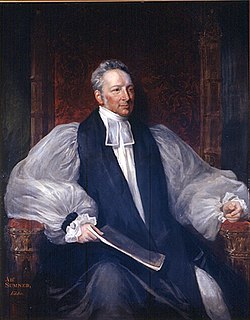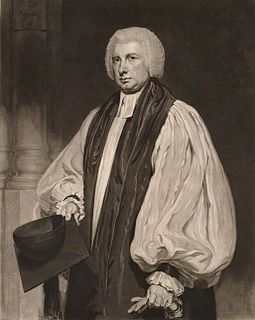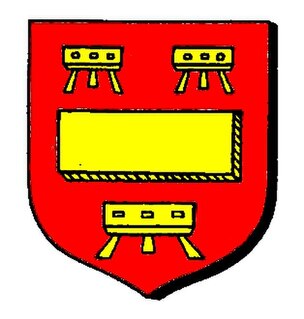Robert Winchelsey was an English Catholic theologian and Archbishop of Canterbury. He studied at the universities of Paris and Oxford, and later taught at both. Influenced by Thomas Aquinas, he was a scholastic theologian.

John Bird Sumner was a bishop in the Church of England and Archbishop of Canterbury.
William Courtenay was Archbishop of Canterbury (1381–1396), having previously been Bishop of Hereford and Bishop of London.

John Cosin was an English churchman.
John Blakiston, was a member of the English parliament, one of the regicides of King Charles I of England, a prominent mercer and coal merchant, puritan and anti-Episcopalian.
William de Wickwane was Archbishop of York, between the years 1279 and 1285.

Lawrence Booth served as Prince-Bishop of Durham and Lord Chancellor of England, before being appointed Archbishop of York.
John Julian was a Church of England clergyman, known as the editor of A Dictionary of Hymnology. Throughout the twentieth century and into the twenty-first this was the common reference for those studying hymnody and hymnology. His own estimate was that there were 400,000 hymns in the scope of his chosen field; his correspondents for research numbered over 1000. It was only superseded over a century later by the online Canterbury Dictionary of Hymnology.

James Cornwallis, 4th Earl Cornwallis was a British clergyman, and peer.
Richard Nykke was bishop of Norwich, the last Roman Catholic to hold the post before the Henrician reform. Described as "ultra-conservative", but also "much-respected", he maintained an independent line and was embroiled in conflict until blind and in his last years. He is often called the last Catholic bishop of the diocese, but that title is also claimed by John Hopton, bishop under Mary I of England. Norwich at this time was the second-largest conurbation in England, after London.
Thomas Sparke was the only medieval incumbent of the office of Bishop of Berwick in England. Previously Prior of Lindisfarne and Prebendary at Durham Cathedral, he was consecrated by Edward Lee, Archbishop of York, in 1536 and continued in post until his death in 1572.
Alistair James Magowan is a British retired Anglican bishop. He served as the Bishop of Ludlow — the sole suffragan bishop of the Church of England Diocese of Hereford — from 2009 until his 2020 retirement.
Thomas Stanley was Bishop of Sodor and Man during the English Reformation-era.
Thomas Dampier was Dean of Durham from his installation on 17 June 1774 until his death.

John Sudbury was Dean of Durham from his installation on 15 February 1661 until his death on 29 November 1684. He was born at Bury St Edmunds in 1604, educated at Emmanuel College, Cambridge and ordained in 1629. He was Vicar of Leigh, Kent from 1639 to 1642 and a Prebendary of Westminster from 1660 to 1661.

Andrew Stratford, also known as Andrew de Stratford and Andrew de Strelford, was a medieval English landowner and verderer of the House of Stratford.
Christopher Plummer was a Canon of Windsor from 1513 - 1535. He was attainted and deprived in 1535.
Newton Ogle (1726-1804) was a Church of England clergyman and member of the landowning Ogle family. The son of Nathaniel Ogle and Elizabeth Newton, he served as a prebendary of Durham Cathedral and from 1769 to 1804 as Dean of Winchester. His wife Susanna Thomas was daughter of John Thomas, Bishop of Winchester.
The Ven. Henry Egerton (1729–1795) was Archdeacon of Derby from 1769 until his death.
John Howorth, D.D. was a 17th-century priest and academic.





